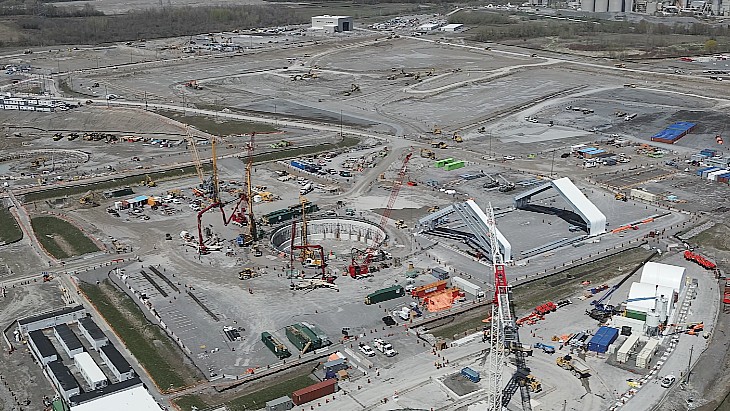'Practical but radical' UK energy policies
Wednesday, 23 May 2007
Trade and Industry Secretary Alistair Darling launched the UK's white paper on energy, focused on energy efficiency and the promotion of low carbon sources. It is accompanied by a consultation document on new nuclear power.
 Writing in The Times, prime minister Tony Blair called the white paper's proposals "practical but radical."
Writing in The Times, prime minister Tony Blair called the white paper's proposals "practical but radical."
The white paper is based on last year's Energy Review, which highlighted the UK's upcoming energy challenge. As production of natural gas from the North Sea begins to decline, the country will become a net importer of the fuel, which has also increased greatly in price in recent years. At the same time, about 30-35 GWe of the UK's electricity generation infrastructure must be replaced, including all but one of the nuclear power plants that currently generate around 20% of electricity. Around two thirds of this investment must come before 2020, and current concerns about climate change dictate that this capacity should be replaced by low-carbon technologies as far as possible.
In response to the domestic situation and in the context of the global climate change problem, the UK government's response has been to produce an energy white paper which sets out a domestic and international climate change strategy, to be implemented at home to renew infrastructure.
The international strategy would see UK politicians:
After describing the benefits of energy saving and renewable generation, the white paper notes that the UK reactor fleet is ageing and due for an almost complete shutdown by 2023, when only Sizewell B is expected to be operating. In the context of climate change concerns and given that it is uncertain at what speed renewable technologies will develop, the white paper states "We recognise that, as with all generation technologies, there are advantages and disadvantages with new nuclear power. But having reviewed the evidence and information available, we believe that the advantages outweigh the disadvantages and that the disadvantages can be effectively managed."
"On this basis, it is the government's preliminary view that it is in the public interest to give the private sector the option of investing in new nuclear power stations."
The white paper says that without nuclear power as an option, the country would be reliant on a more limited number of technologies, some of which are yet to be proven at a commercial scale. "This would expose the UK to security of supply risks because our electricity supplies would probably be less diverse as a result of excluding nuclear." It continues: "By removing one of the currently more cost-effective low-carbon options, we would increase the risk of failing to meet our long-term carbon reduction goal."
Consultation
In 2003 the UK government published an energy white paper in which nuclear power was sidelined, but not excluded. In that document, the "fullest possible" public enquiry was promised before a change in policy. For that reason, the government's views on nuclear were described as 'preliminary' and a consultation document accompanied the white paper which describes how the government reached its view. This consultation is the government's second attempt after the first, which followed the Energy Review, was ruled to be flawed after legal action was taken by Greenpeace. Respondents have until 10 October to participate.
One issue under consultation is the range of measures proposed to 'facilitate' private investment in nuclear power, including improvements to the energy planning system, strategic site assessment processes, assisting the Nuclear Installations Inspectorate in developing generic reactor design assessment procedures and introducing arrangements to protect taxpayers from costs associated with dismantling plants and long-term storage of radioactive wastes.
Further information
Health and Safety Executive: New nuclear power stations - Generic Design Assessment
Department of Trade and Industry: Energy White Paper
WNA's Nuclear Power in the United Kingdom information paper
WNN: New UK planning process could facilitate new nuclear build
WNN: Consultation ruled "seriously flawed"
Trade and Industry Secretary Alistair Darling launched the UK's white paper on energy, focused on energy efficiency and the promotion of low carbon sources. It is accompanied by a consultation document on new nuclear power. Writing in The Times , prime minister Tony Blair called the white paper's proposals "
 Writing in The Times, prime minister Tony Blair called the white paper's proposals "practical but radical."
Writing in The Times, prime minister Tony Blair called the white paper's proposals "practical but radical."The white paper is based on last year's Energy Review, which highlighted the UK's upcoming energy challenge. As production of natural gas from the North Sea begins to decline, the country will become a net importer of the fuel, which has also increased greatly in price in recent years. At the same time, about 30-35 GWe of the UK's electricity generation infrastructure must be replaced, including all but one of the nuclear power plants that currently generate around 20% of electricity. Around two thirds of this investment must come before 2020, and current concerns about climate change dictate that this capacity should be replaced by low-carbon technologies as far as possible.
In response to the domestic situation and in the context of the global climate change problem, the UK government's response has been to produce an energy white paper which sets out a domestic and international climate change strategy, to be implemented at home to renew infrastructure.
The international strategy would see UK politicians:
- Work to establish an international framework to tackle climate change, including a strengthened EU Emissions Trading Scheme.
- Provide legally binding carbon targets for the whole UK economy which would progressively reduce emissions.
- Make further progress in achieving fully competitive and transparent international markets.
- Encourage energy saving through information, incentives and regulation.
- Provide more support for low-carbon technologies.
- Ensure the right conditions for investment, partly by introducing a value for carbon.
After describing the benefits of energy saving and renewable generation, the white paper notes that the UK reactor fleet is ageing and due for an almost complete shutdown by 2023, when only Sizewell B is expected to be operating. In the context of climate change concerns and given that it is uncertain at what speed renewable technologies will develop, the white paper states "We recognise that, as with all generation technologies, there are advantages and disadvantages with new nuclear power. But having reviewed the evidence and information available, we believe that the advantages outweigh the disadvantages and that the disadvantages can be effectively managed."
"On this basis, it is the government's preliminary view that it is in the public interest to give the private sector the option of investing in new nuclear power stations."
The white paper says that without nuclear power as an option, the country would be reliant on a more limited number of technologies, some of which are yet to be proven at a commercial scale. "This would expose the UK to security of supply risks because our electricity supplies would probably be less diverse as a result of excluding nuclear." It continues: "By removing one of the currently more cost-effective low-carbon options, we would increase the risk of failing to meet our long-term carbon reduction goal."
Consultation
In 2003 the UK government published an energy white paper in which nuclear power was sidelined, but not excluded. In that document, the "fullest possible" public enquiry was promised before a change in policy. For that reason, the government's views on nuclear were described as 'preliminary' and a consultation document accompanied the white paper which describes how the government reached its view. This consultation is the government's second attempt after the first, which followed the Energy Review, was ruled to be flawed after legal action was taken by Greenpeace. Respondents have until 10 October to participate.
One issue under consultation is the range of measures proposed to 'facilitate' private investment in nuclear power, including improvements to the energy planning system, strategic site assessment processes, assisting the Nuclear Installations Inspectorate in developing generic reactor design assessment procedures and introducing arrangements to protect taxpayers from costs associated with dismantling plants and long-term storage of radioactive wastes.
Further information
Health and Safety Executive: New nuclear power stations - Generic Design Assessment
Department of Trade and Industry: Energy White Paper
WNA's Nuclear Power in the United Kingdom information paper
WNN: New UK planning process could facilitate new nuclear build
WNN: Consultation ruled "seriously flawed"
Most Read

International banks express support for nuclear expansion
Monday, 23 September 2024

Cabinet moves to reverse Italy's anti-nuclear stance
Monday, 3 March 2025

Sweden budgets for nuclear new build
Wednesday, 11 September 2024
.jpg)
Switzerland moves to remove ban on new reactors
Thursday, 29 August 2024
Podcasts & Features
Viewpoint: Reframing nuclear's talent challenge - why scarcity is a myth
Podcasts & Features Wednesday, 14 May 2025






_79311.jpg)

